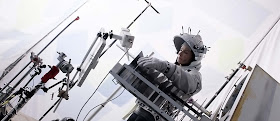During the past year the industry has been in revolt. There's talk of a union, or perhaps a trade organization, and putting an end to unfair and crippling tax-breaks. A lot of very heavy issues plague an already insecure industry, slave to a never-ending cycle of technology upgrades and notorious low profit margins.
While I have a problem with the over-reliance on CGI in some Hollywood films, I'm a HUGE fan of a) credit where credit's due, 2) paying people properly for their work and 3) a sustainable visual effect industry, where talent and not random tax breaks determines who stays in business.
Back when Life of Pi was up for an Oscar this image (or variations thereof) started to circle the internet:
This year, also around Oscar time, visual effect maestro extraordinary Todd Vaziri put this image up on his blog:
Images DO speak a thousand words, don't they?
As fun as these images are, they're also a bit obvious. Of course an effect-driven film will look silly without effects, much like a musical would look odd with long stretches of silence, where the songs should be. But here's the thing: Every film these days uses visual effects. Well, virtually every film. A collapse of the visual effect industry won't just hit those big superhero movies, it'll hurt across the board.
So I've dug up these examples of the effect work done in some of the non-effect movies nominated for a Best Film Oscar this year. Everyone knows that Gravity wouldn't look like much without its effects, no need to go any further into that, but what about the other films?
Philomena
A sweet little story about a sweet old British lady buzzing off to the US to find her son, no need for effects there, right? Wrong. The job included numerous digital backlots and faking Washington DC.
Effects below by Union VFX.
Dallas Buyers Club
Now here's an example of a good old-fashioned movie, salt of the earth type stuff. No bells and whistles here, and surely no effects either, right?
Actually this low-budget, fast-paced production was apparently forced to fake quite a few locations. On top of that, numerous fixes were required to clean up continuity errors and match pick-up shots.
Effects below by Fake.
American Hustle
Faking period New York required a ton of work, and apparently the visual effects team (from Zero VFX) had to remove reflections in sunglasses from pretty much the entire freakin' movie! They also had to do a complete reconstruction of the Plaza Hotel:
Captain Phillips
Okay, so SEAL team parachuting and busy aircraft carriers are obvious effects (but still cool, of course).
But an element often overlooked in the heat of battle: The monitors. Some guy had to sit there and not only add images to every monitor, but also figure out what those images should be. (That guy was Chris Lunney, according to the FX Guide article.)
Effects by Nvizible Visuals Effects.
12 Years a Slave
12 Years a Slave also required heavy post-production augmentations to establish the proper period look, and of course the gruesome whipping sequence had some VFX assistance as well.
Effects below by Wildfire.
The Wolf of Wall Street
The opulent nature of the movie lends itself to over the top effects work, so The Wolf of Wall Street features quite a few obvious (though not necessarily bad) effect shots. It also features some pretty invisible work, though.
Here are some examples of how The Wolf of Wall Street would look, without effects, from Brainstorm Digital, ScanlineVFX and Method Studios.
Gravity
Okay, I lied. I couldn't help but include some examples from the Oscar-winning Gravity after all. Let's say they make up for the fact that I couldn't find any examples from Her or Nebraska.
Here is Gravity sans effects, courtesy of Framestore.
WRAP-UP
I'm not the right person to get into the whole union / tax-break VFX discussion, other far more knowledgeable people can handle that, but this much seems obvious to me: Considering how much film studios rely on visual effects, how much they use effect shots to promote their films, and how much money big effect films make these days, the studios need to treat the creators of those images properly. It's as simple as that.
If you keep kicking the guy who carries you on his back, he will eventually dump you in a ditch and find something better to do.








































No comments:
Post a Comment